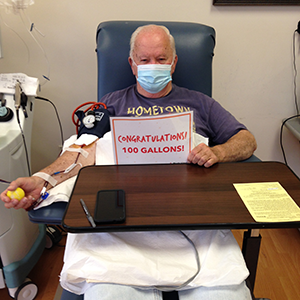At 20 years old in Bermuda, Gerry Southland encountered a pregnant woman who was hemorrhaging during childbirth and needed emergency blood in order to survive. It was then that he realized who blood donations helped and how critical blood is. It was something that he felt compelled to do as a simple and easy way of giving back to the world.

Gerry donated throughout the years at local hospitals and other blood centers in areas that he lived, and then eventually at Rhode Island Blood Center.
Through spending time at the blood center as a whole blood donor, he learned more about apheresis. His rare A- blood (only 6% of the population) was ideal for platelet donations. Platelets are collected through a special device, which allows you to give just the part of your blood patients need the most, including patients undergoing chemotherapy and radiation.
“Any time I see a picture of a kid with cancer, I remember this is what it’s all about.”
During the automated donation of platelets, the device separates your blood and takes only the platelets, and puts the rest of the components back into your body. “At the time, apheresis was performed using both arms—in the left, out the right—and it was tough sitting for long periods of time without moving either arm,” Gerry says. “Now, it’s done using just one arm in a much more streamlined process. It’s time I enjoy relaxing just watching the Weather Channel.”
“It’s a habit, but a good habit. It’s all about all of the lives that you touch with just a little of your time.”
Gerry is as consistent as they come: you can give platelets every two weeks, up to 24 times a year, and he makes it a point to come in twice a month to our South County location and donate. Gerry is now the ninth member of the 100 Gallon Club, an elite group of dedicated donors who have reached 100 gallons of blood donated through RIBC.
Learn more about the platelet donation process including why platelets are referred to as “liquid gold”, and how you can get some much-earned “me-time” donating.
